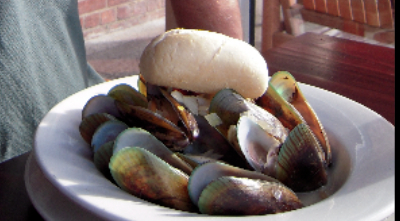I went on a date with my wife last week.
Not like that new movie, Date Night, which looks horrible, but at 1 p.m., when we have a babysitter. Anything later than that is too tiring to contemplate.
 Being in Kansas, I ordered the mussels from Prince Edward Island (that’s in Canada) and the featured white wine from Australia, which, to our ultimate surprise, cost $15 a glass. The extent to which restaurants will go to rip people off, especially in a crappy economy, apparently knows no bounds. I take responsibility, but won’t be going back.
Being in Kansas, I ordered the mussels from Prince Edward Island (that’s in Canada) and the featured white wine from Australia, which, to our ultimate surprise, cost $15 a glass. The extent to which restaurants will go to rip people off, especially in a crappy economy, apparently knows no bounds. I take responsibility, but won’t be going back.
I’m also not alone.
The Washington Post reported yesterday that the expensive "sheep’s milk" cheese in a Manhattan market was really made from cow’s milk. And a jar of "Sturgeon caviar" was, in fact, Mississippi paddlefish.
Some honey makers dilute their honey with sugar beets or corn syrup, their competitors say, but still market it as 100 percent pure at a premium price.
And last year, a Fairfax man was convicted of selling 10 million pounds of cheap, frozen catfish fillets from Vietnam as much more expensive grouper, red snapper and flounder. The fish was bought by national chain retailers, wholesalers and food service companies, and ended up on dinner plates across the country.
"Food fraud" has been documented in fruit juice, olive oil, spices, vinegar, wine, spirits and maple syrup, and appears to pose a significant problem in the seafood industry. Victims range from the shopper at the local supermarket to multimillion companies, including E&J Gallo and Heinz USA.
Such deception has been happening since Roman times, but it is getting new attention as more products are imported and a tight economy heightens competition. And the U.S. food industry says federal regulators are not doing enough to combat it.
